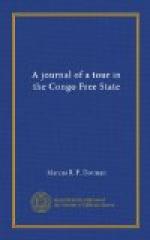We reach Hambi, which is a large Station well built and very tidy, the next day. The Company leases a very extensive territory along the river banks and does a large trade in rubber and ivory, the Brazilian variety of the former growing here very well. The natives are quite satisfied, work well and give very little trouble, although it is necessary to punish them sometimes, and as usual, the prisoners on the chain are given work to do outside the prison. We stay here one day and then descend the Lomani, and turn up the Congo. The banks of the river now have a new appearance, for they are higher and no longer densely wooded and at short intervals are villages thickly populated and containing a high percentage of children. Most of the men fish or build canoes, and all the people seem to be constantly trading with each other, selling food or curiosities for mitakos or cloth.
We stop for the night at Yonanghe, a Post which has been built by a true native of the Congo, who at one time was the boy of Inspecteur d’Etat, Malfeyt. He has travelled to Europe, speaks French and English and makes an excellent Chef du Poste, which rank he enjoys officially, with all its rights and privileges. Everyone agrees he is thoroughly responsible and a very good friend, but if a captain of a steamer offends him, he will not sell him a chicken or even an egg for any sum.
On the 15th we reach Yakussu, where is a Mission Station of the English Baptists. As I cannot go ashore, the missionary, Mr. Stapleton, comes on board and we have an interesting chat. He has known the Bangala District for many years and has seen the riverside population diminish very much during the last fifteen years. This he ascribes partly to the Sleeping Sickness and partly to emigration to the State Posts. At first it was very difficult for the people to raise enough food for themselves and for the soldiers in the Posts, and to avoid the hard work, many accepted service under the State. Here however, near Stanley Falls, there is plenty of food and the people have no difficulty in providing for their own wants and in supplying the State Posts as well. He thinks that after the cruelty of the Arabs, the rule of the white man appears as heaven to the native. All are therefore contented and happy, and as there is very little Sleeping Sickness, the population is increasing. The Mission boys are taught to be carpenters, masons and brick makers, for food is so plentiful that there is no need to establish plantations. The chief grievance of Mr. Stapleton is, that the Government will not permit the missionaries to settle where they wish and will not grant them land. Several other missionaries have also complained of this, but some districts are certainly not civilised at present, and it would be dangerous for any white man to live in them without a military guard. It thus happens that while there are a great number of Mission Stations along the Congo in the part where the population has diminished greatly, there is not a single Mission on the State side of the Ubangi river where the people are very numerous.




